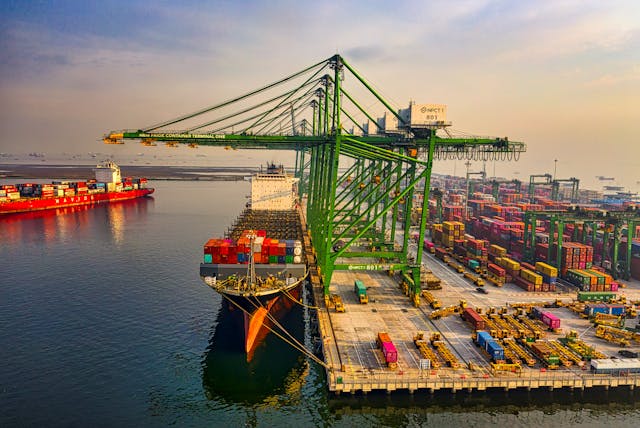Moving goods across borders requires more than just planning and transportation. When we talk about international logistics for industrialized products, As you can see, we are dealing with a complex operation involving tax, regulatory, customs, health and operational aspects. And each stage needs to be strategically thought out so that delivery takes place on time, safely and legally.
In this content, you will understand the main precautions when structuring the international logistics of industrialized products, what can lead to risks in the process, how to avoid unnecessary costs and why having a company specialized in import and export can be decisive for the success of the operation.
What is International Logistics for Industrialized Products?
A international logistics for industrialized products comprises all the planning, coordination and execution of the transportation of goods between countries, taking into account factors such as storage, packaging, modes of transportation, customs clearance, operating costs and deadlines.
As these are products with high added value and often with specific technical characteristics, this type of logistics requires extra attention at every point in the supply chain. An error in documentation or the wrong choice of transportation can cause delays, fines or even compromise the integrity of the cargo.
Critical Steps in International Logistics for Industrialized Products
Ensuring an efficient operation requires each stage to be carried out precisely. Below are the key points that deserve special attention.
1. Strategic Operation Planning
It all starts with detailed planning. Even before placing an order with a supplier or international buyer, it is essential to map out all the legal requirements, costs involved, available modes and the most efficient routes.
Planning also involves setting realistic schedules, taking into account production time, shipping, customs clearance and transportation to the final destination.
2. Correct Tax Classification of Products
Each industrialized product has an NCM (Mercosur Common Nomenclature) code that defines its tax and administrative treatment. Incorrect classification can result in undue payment of taxes, requirements for non-applicable licenses or withholding of cargo.
This is one of the most common mistakes and also one that generates the most losses in the operations of international logistics for industrialized products.
3. Choosing the mode of transport
The choice between sea, air, road or multimodal transportation depends on the type of product, delivery time, value of the cargo and destination. Heavier and bulkier industrialized products are usually shipped by sea, while items with high added value or that require speed can be transported by air.
It's important to assess the cost-benefit of each mode, as well as the infrastructure available in the country of origin and destination.
4. Packaging and Storage
Industrialized products require specific packaging to guarantee their integrity during international transport. This includes resistance to impacts, temperature variations, humidity and stacking.
In addition to packaging, temporary storage in bonded areas or logistics centers also needs to follow standards that prevent loss or contamination. The use of pallets, sealed containers and internal protection is recommended to preserve the value of the cargo.
5. Licensing and Regulatory Bodies
Some industrialized products require authorization from bodies such as Inmetro, Anvisa, Ibama or Mapa to enter or leave Brazil. This depends on the nature of the product, its application and its environmental or health impact.
Not checking the need for licenses can significantly delay the process of international logistics for industrialized products, In addition to generating legal penalties.
6. Technical and customs documentation
Documentation is one of the most sensitive and decisive parts of international logistics. In order for goods to be released at ports or airports, documents such as:
- Commercial Invoice
- Bill of Lading (BL, AWB, CRT)
- Packing List
- Certificates of Origin
- Licenses (where applicable)
- Single Export or Import Declaration (DU-E / DUIMP)
A lack of or error in any of these documents can interrupt the logistics flow and impact the entire operation.
7. Cost Management and Foreign Exchange
International logistics involves various costs, such as international freight, insurance, port fees, warehousing, customs clearance and taxes. In addition, the exchange rate can affect the final value of the operation.
Monitoring and simulating these costs in advance is essential to maintaining the profitability of the operation and avoiding surprises at the time of clearance.
Common Risks in the International Logistics of Industrialized Products
Even with planning, some companies still make mistakes that jeopardize the operation:
- Lack of tax analysis before negotiation
- Negotiating with suppliers without legal backing
- Lack of international insurance
- Use of unsuitable packaging for long transportation
- Hiring inexperienced logistics operators
- Unfamiliarity with the requirements of the destination country
Avoiding these mistakes is a matter of strategy as well as technical support.
The Importance of Relying on a Specialized Import and Export Company
Given the complexity involved in international logistics for industrialized products, count on a import-export company specialized is a differential that generates efficiency, economy and legal certainty.
This type of company acts as a strategic partner in all phases of the operation:
- Supports international negotiations with suppliers or clients
- Tax classification and analysis of products
- Prepare and review all required documentation
- Indicates the most advantageous modes and quotes carriers
- Manages customs clearance and contact with regulatory bodies
- Monitors each stage until final delivery at destination
With this support, your company avoids mistakes, reduces costs and gains time to focus on what really matters: selling, producing and growing.
Operate Safely, Deliver Efficiently
A international logistics for industrialized products can be a complex process, but with proper planning and specialized support, it becomes a powerful competitive advantage. The more fluid your logistics operation, the greater your chances of conquering new markets and serving your customers with excellence.
By choosing partners with proven experience, your company will be prepared to operate with agility, security and predictability anywhere in the world.





